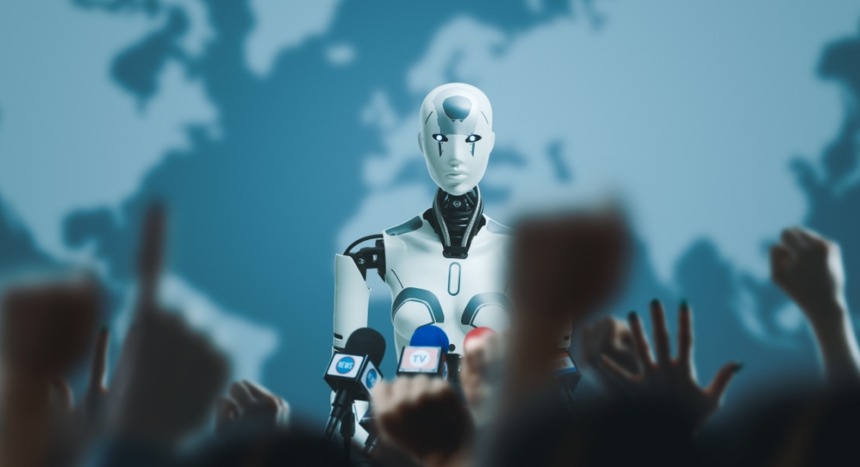In the rapidly evolving world of artificial intelligence development, 2025 was a landmark year for its intersection with politics. As AI technologies became increasingly sophisticated, their influence on governance, elections, policymaking, and public opinion reached unprecedented levels. Let’s dive into the lessons learned about AI’s role in politics in 2025, examining its implications, challenges, and opportunities.
The Rise of AI in Political Campaigning
AI-powered tools revolutionized political campaigning in 2025, offering enhanced capabilities to understand and engage voters. Campaign teams deployed advanced AI algorithms to analyze voter behavior, predict election outcomes, and tailor messages.
For instance, AI tools processed vast datasets from social media, public records, and surveys to create hyper-targeted advertisements. By identifying the unique concerns of specific voter groups, campaigns crafted personalized messages that resonated deeply. This precision transformed traditional canvassing methods, making outreach more efficient and impactful.
Additionally, chatbots and virtual assistants became integral to campaigns. They interacted with millions of voters, answering questions, addressing concerns, and promoting candidate platforms. These AI-driven interactions bridged communication gaps, offering voters a direct line to political representatives.
AI’s Role in Combating Misinformation
Misinformation has long plagued politics, but AI stepped up as a powerful ally against fake news in 2025. Machine learning algorithms were deployed to detect and debunk false narratives before they could gain traction.
AI systems analyzed millions of online posts, videos, and news articles in real time. They flagged misleading content, provided evidence-based corrections, and alerted platforms to potential disinformation campaigns. This proactive approach significantly curbed the spread of false information, fostering a more informed electorate.
However, challenges persisted. Bad actors also used AI to create convincing deepfakes and manipulate narratives. This cat-and-mouse dynamic underscored the need for constant innovation in AI tools to stay ahead of malicious uses.
Ethical Challenges in AI-Driven Politics
The integration of AI into politics raised significant ethical concerns. Questions about data privacy, algorithmic bias, and accountability came to the forefront.
In 2025, many voters expressed discomfort with how campaigns collected and utilized their personal data. While AI-enabled hyper-personalization proved effective, it often blurred the lines of ethical data usage. Policymakers grappled with balancing innovation and privacy rights.
Moreover, biases in AI algorithms posed risks to fair representation. If AI tools were trained on biased datasets, they could reinforce stereotypes or marginalize certain groups. Ensuring transparency and fairness in AI systems became a critical focus for political stakeholders.
AI-Driven Policymaking and Governance
AI didn’t just influence campaigns; it also transformed governance. Governments leveraged AI to make data-driven decisions, streamline administrative processes, and enhance public services.
For instance, predictive analytics helped policymakers anticipate societal needs, from healthcare demands to infrastructure planning. By analyzing historical and real-time data, AI offered actionable insights, enabling more effective resource allocation.
Additionally, AI-powered platforms facilitated citizen engagement. Virtual town halls and digital forums allowed citizens to voice their opinions, while AI analyzed feedback to guide decision-making. This collaborative approach strengthened democracy by making governance more inclusive and responsive.
The Impact of AI on Election Integrity
Election integrity remained a critical concern in 2025, with AI playing a dual role as both a safeguard and a threat. On one hand, AI enhanced security measures to protect electoral systems. It detected anomalies in voter databases, monitored for cyber threats, and ensured accurate vote counting.
On the other hand, AI tools were exploited for election interference. Malicious actors used AI-generated content to mislead voters or suppress turnout. These challenges highlighted the importance of robust cybersecurity measures and ethical AI practices to preserve democratic processes.
AI’s Influence on Public Opinion
The power of AI to shape public opinion reached new heights in 2025. Social media platforms utilized AI algorithms to curate content, amplifying certain narratives while suppressing others.
While this helped users discover relevant information, it also created echo chambers, where individuals were exposed only to like-minded viewpoints. This polarization deepened societal divides and complicated political discourse. Policymakers and tech companies worked to redesign algorithms to promote balanced information and reduce bias.
AI also played a pivotal role in opinion polling. Traditional surveys were supplemented with AI-driven sentiment analysis, which gauged public mood through online interactions. These insights provided a real-time understanding of voter concerns, shaping political strategies.
The Role of AI in International Relations
AI significantly influenced global politics, particularly in diplomacy and international relations. Nations harnessed AI to analyze geopolitical trends, forecast conflicts, and optimize foreign policy strategies.
For example, AI tools monitored international markets, political developments, and military activities to provide real-time intelligence. This data-driven approach enhanced decision-making and fostered proactive diplomacy.
However, the use of AI in warfare raised ethical and security concerns. Autonomous weapons and AI-driven surveillance posed threats to global stability, prompting calls for international regulations to govern their use.
The Intersection of AI, Politics
Mobile app development services emerged as a critical component in leveraging AI for political purposes. In 2025, political campaigns and governments alike relied on custom apps to engage citizens and disseminate information.
AI-powered mobile apps offered personalized user experiences, allowing voters to access tailored content, participate in polls, and connect with representatives. These apps also integrated advanced analytics, providing real-time insights into user behavior and preferences.
Furthermore, mobile app development services played a role in combating misinformation. Developers created apps that verified news sources, flagged fake content, and educated users about critical issues. This proactive approach empowered citizens to make informed decisions.
The Road Ahead
As we look beyond 2025, it’s clear that AI will continue to shape politics in profound ways. To maximize its potential while mitigating risks, stakeholders must prioritize ethical innovation, robust regulations, and public awareness.
Governments should establish frameworks to ensure transparency and accountability in AI systems. Collaboration between policymakers, tech companies, and civil society is essential to address challenges and build trust.
Additionally, investing in AI literacy will empower citizens to navigate the digital landscape. By understanding how AI influences politics, voters can engage critically and advocate for fair practices.
Conclusion
The lessons of 2025 underscore the transformative power of AI in politics. From revolutionizing campaigns to reshaping governance, AI’s influence is undeniable. However, its potential comes with significant responsibilities. By addressing ethical concerns, fostering innovation, and promoting collaboration, we can harness AI to strengthen democracy and create a more equitable political future.






